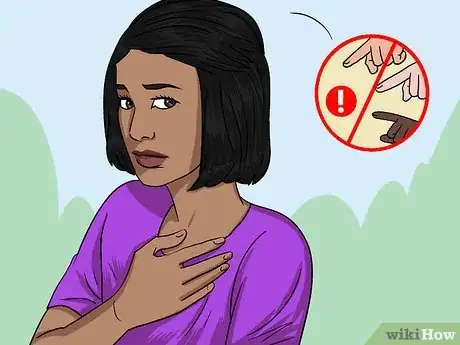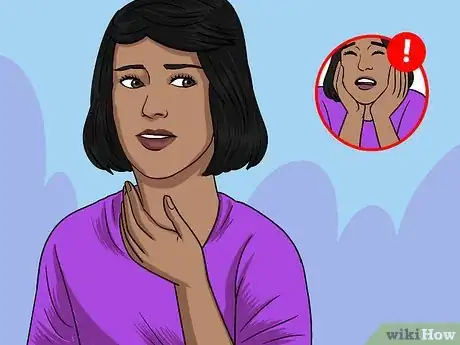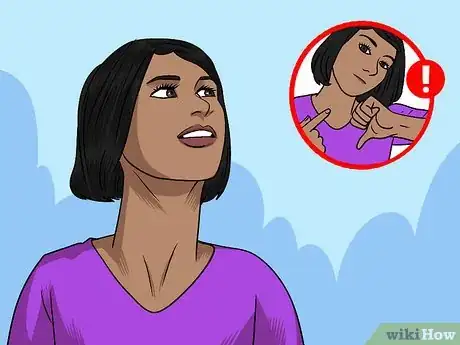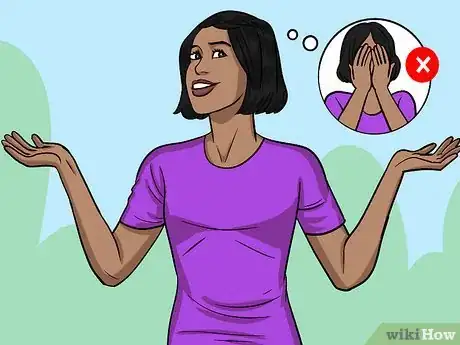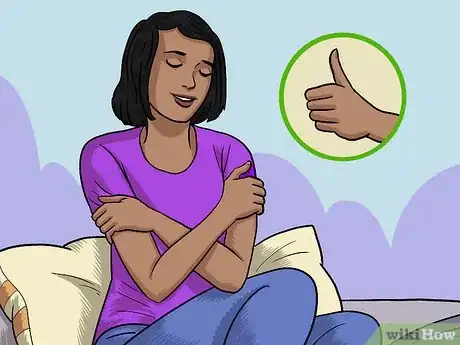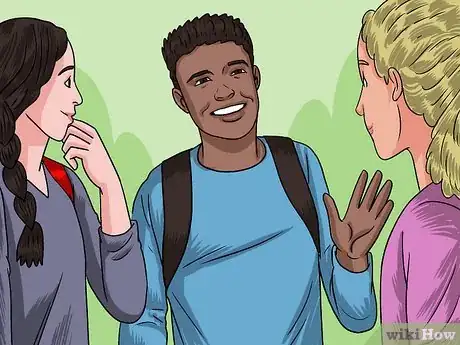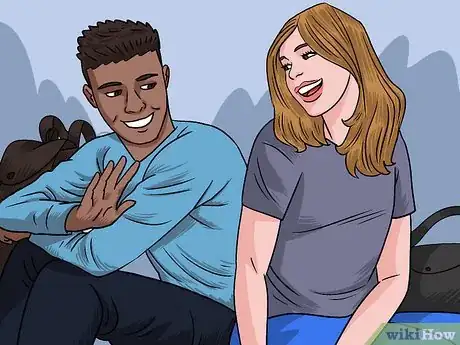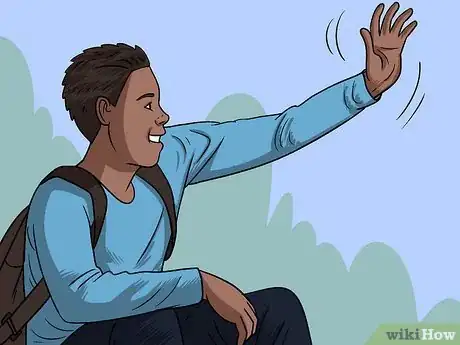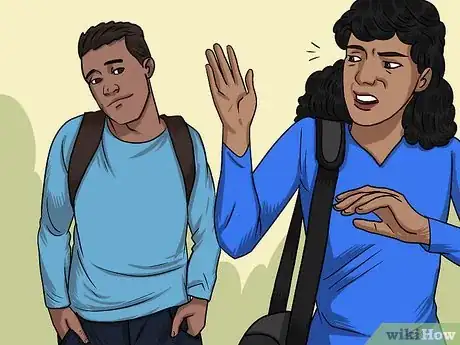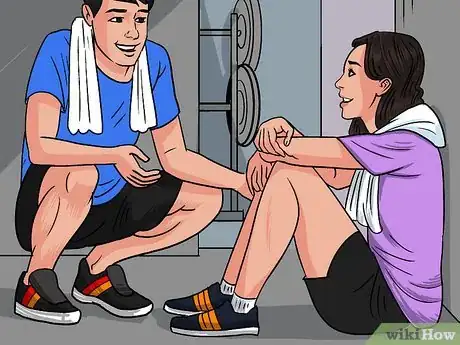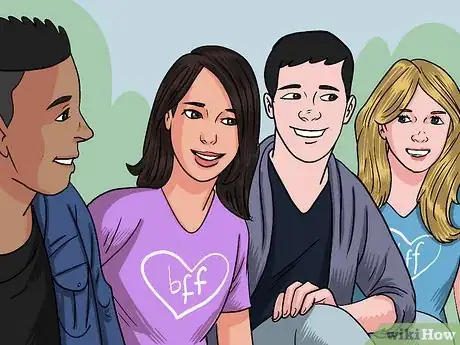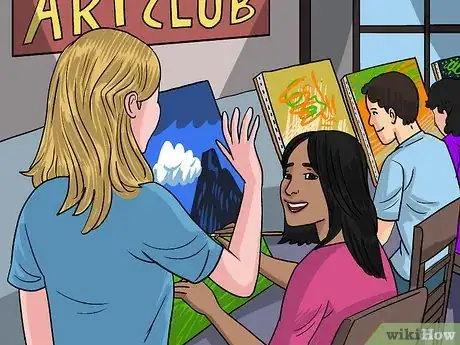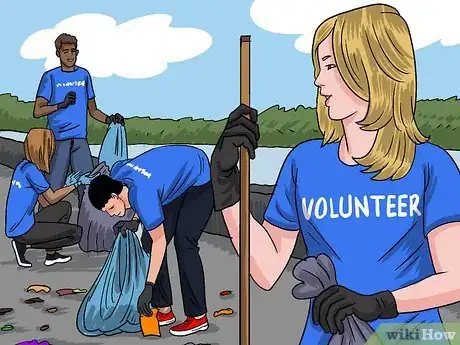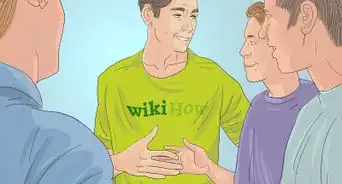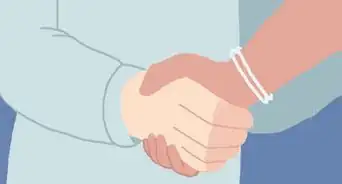This article was co-authored by Christy Irvine, PhD. Dr. Christy Irvine is a Licensed Clinical Psychologist and the owner of her private practice out of Portland, Oregon. With over 10 years of experience, she specializes in individual and couples therapy using various techniques including Emotionally Focused Therapy (EFT), Acceptance and Commitment Therapy (ACT), Interpersonal-Process Therapy, and Cognitive Processing Therapy (CPT). Dr. Irvine holds a B.A. in Psychology from Whitman College and a Ph.D. in Clinical Psychology from The University of Connecticut.
There are 7 references cited in this article, which can be found at the bottom of the page.
This article has been viewed 30,211 times.
Being afraid of making friends can hinder your social life. This fear can keep you from making the connections that you deserve. If you are afraid to make friends, you can overcome this fear by realizing that people aren’t judging you or thinking bad things, accepting that everyone makes mistakes, working on your social skills, and learning where to meet people.
Steps
Addressing Your Fears
-
1Focus on how you feel about yourself. One of the things that makes people afraid to make friends is the thought that people are judging you and thinking bad thoughts about you. While some people may judge you from time to time, most people are too busy thinking about their own lives to think about you to the degree you fear.[1] To overcome worries about people judging you, try to focus on how you feel about yourself.[2]
- Tell yourself when you are trying to make friends, “People are not judging me. People think about themselves more than me. They are probably just as worried about others judging them as I am.”
- Identify your feelings about yourself. For example, if you make a daring fashion choice, then does that make you feel bold, insecure, quirky, or attractive?
-
2Realize others won’t care if you embarrass yourself. Another thing that makes people nervous to make friends is that they are afraid they will embarrass themselves. If they do something stupid or wrong, it will cause deep humiliation, and everyone will laugh, judge, and not like them. However, this is not true. Most people won’t think about your “embarrassment” a minute after it occurs.[3]
- Tell yourself, “If I embarrass myself, it will not be the end of the world. People won’t make as big of a deal about it as I will. They don’t care and may not even notice.”
Advertisement -
3Remember that you are your worst critic. Sometimes people find it hard to be social and make friends because they constantly remind themselves of why other people wouldn’t like them. You may tell yourself that you are worthless, stupid, or unworthy of someone’s friendship. This is not true. You deserve friends just like everyone else.[4]
- When you think these thoughts, tell yourself, “These negative thoughts are my own distorted thoughts because I am my worst critic. Other people are not nearly as harsh about me as I am. I am worthy of friendship and deserve to be liked by others.”
-
4Stop obsessing about things that have happened. Sometimes, our social fears lead us to obsess about things that we did while around other people. We dissect everything we said, focus on how stupid we are, and dwell on every mistakes. Other people don’t think this about you, so you should stop yourself when you do this.[5]
- When you find yourself replaying a conversation or interaction, tell yourself, “Stop this. I am viewing this in a distorted way, making it worse than it was. I will not let myself do that.”
- If you did experience something that didn’t go as planned, tell yourself, “It is okay that this did not go the way I wanted. I may have said something wrong and embarrassed myself, but I am still a worthy person. Everyone makes mistakes.”
-
5Tell yourself it’s okay to make mistakes. No one is perfect. No one expects you to be perfect. If you think you can’t make friends unless you are perfect all the time, you should understand this is not true. People make mistakes, and most people connect more to someone who is flawed and vulnerable than someone who acts like they are perfect all the time.[6]
- Weaknesses, failures, and faults can be endearing. They make us relatable. Being open about these things can help you form connections with others because they also have faults and imperfections.
Strengthening Your Social Skills
-
1Smile at people. One way to start overcoming your fear of making new friends is to smile at people. This may seem simple, but making eye contact and smiling is a low-stakes form of interaction. You will probably find that most people smile back and even speak.[7]
- You can add a “Hello” or “How are you?” to your smile to increase your social interaction.
-
2Practice talking to others. The more you talk to other people, the more you will feel comfortable interacting and making friends. Speak to people or compliment them on something.[8] Ask someone a question when you are standing around, or start a conversation with someone at work, a cashier, or a classmate.[9]
- For example, you may tell someone, “I like your jacket” or ask someone, “Have you eaten here before? What do you suggest?”
- If the interaction isn’t a success, shake it off. This is low-stakes and doesn’t matter.
-
3Get out of your head. Part of the fear of making new friends comes from being inside your head and dwelling on fears and unhealthy thoughts. Instead of obsessing over your thoughts, put your focus on the environment around you. Focus on the other people instead of yourself.[10]
- This helps you not obsess about what you want to say, what you may have done wrong, or how you are acting. Focusing on the other person helps reduce your feelings of self-consciousness.
-
4Don’t take things personally. If you have a bad social interaction or someone doesn’t seem like they want to be your friend, try not to let it bother you. There are many reasons a person may not respond positively. No matter what the reason, remember that it’s not the end of the world. You’ll just try again next time.[11]
- A person may be having a bad day or be distracted, so their reaction to you may have nothing to do with you.
Meeting New Friends
-
1Look for people who have good friend qualities. Part of the reason why you might fear making new friends may be due to having negative experiences with new friends in the past. To start choosing people who will be good friends, look for good friend qualities in the people you meet. Some good friend qualities include:[12]
- Trustworthiness.
- Honesty.
- Dependability.
- Loyalty.
- Being supportive and encouraging.
- Empathy.
- Being a good listener.
- Making you feel good when you are around them.
-
2Try a new activity. Trying a new activity can help you meet new people in a low-stakes, comfortable environment. It will give you a chance to get to know the people and become comfortable with them, which can help you overcome your fear of making friends.[13]
- Meeting people at an activity introduces you to people in a situation where you are doing something, which can be less awkward. Plus, you meet people with similar interests.
- You may decide take a sewing or gym class, go to a social meetup, or join a hiking organization.
-
3Socialize in smaller groups. Socializing in large groups may make you too nervous to talk to anyone. Large groups may exacerbate your fears. Instead, get together in smaller groups, which can take some of the pressure off. It’s easier to interact when you are with a small group of people.[14]
- You can go out with friends of friends, or get together with friends of family members or co-workers.
-
4Make friends with people who have similar interests. Befriending people who have similar interests makes it more likely that you will make a friend and enjoy each other’s company. You may find people with similar interests at the local book club who loves reading or someone at a painting class who shares your passion for art.
- Pay attention to the people you interact with every day. This may be people at your job, in your neighborhood, or at places you frequent. These people are already familiar to you, so they are all potential friends.
-
5Join a club or interest group. Clubs or interest groups are filled with people who are interested in the same thing as you. This can help you interact with people in a safe environment. Talking to people who share your interests can help you get over your fear of making friends.[15]
- Try finding an art club, a board game meetup, or a kayaking group. Intramural sports or community arts organizations are also good groups to check out.
-
6Volunteer. Find a cause or organization in your area that you support or are passionate about. This will allow you to help others while meeting people who share your enthusiasm for a cause.[16]
- Check around your area for good causes to volunteer for.
Expert Q&A
-
QuestionWhy am I scared of making new friends?
 Christy Irvine, PhDDr. Christy Irvine is a Licensed Clinical Psychologist and the owner of her private practice out of Portland, Oregon. With over 10 years of experience, she specializes in individual and couples therapy using various techniques including Emotionally Focused Therapy (EFT), Acceptance and Commitment Therapy (ACT), Interpersonal-Process Therapy, and Cognitive Processing Therapy (CPT). Dr. Irvine holds a B.A. in Psychology from Whitman College and a Ph.D. in Clinical Psychology from The University of Connecticut.
Christy Irvine, PhDDr. Christy Irvine is a Licensed Clinical Psychologist and the owner of her private practice out of Portland, Oregon. With over 10 years of experience, she specializes in individual and couples therapy using various techniques including Emotionally Focused Therapy (EFT), Acceptance and Commitment Therapy (ACT), Interpersonal-Process Therapy, and Cognitive Processing Therapy (CPT). Dr. Irvine holds a B.A. in Psychology from Whitman College and a Ph.D. in Clinical Psychology from The University of Connecticut.
Licensed Clinical Psychologist It could be any number of things. It's possible that you had a bad experience when you were trying to make friends once, or it could just be a sign that you're a little socially anxious. The good news is that once you get past that initial barrier, it will be a lot easier!
It could be any number of things. It's possible that you had a bad experience when you were trying to make friends once, or it could just be a sign that you're a little socially anxious. The good news is that once you get past that initial barrier, it will be a lot easier! -
QuestionHow can I stop myself from acting scared?
 Christy Irvine, PhDDr. Christy Irvine is a Licensed Clinical Psychologist and the owner of her private practice out of Portland, Oregon. With over 10 years of experience, she specializes in individual and couples therapy using various techniques including Emotionally Focused Therapy (EFT), Acceptance and Commitment Therapy (ACT), Interpersonal-Process Therapy, and Cognitive Processing Therapy (CPT). Dr. Irvine holds a B.A. in Psychology from Whitman College and a Ph.D. in Clinical Psychology from The University of Connecticut.
Christy Irvine, PhDDr. Christy Irvine is a Licensed Clinical Psychologist and the owner of her private practice out of Portland, Oregon. With over 10 years of experience, she specializes in individual and couples therapy using various techniques including Emotionally Focused Therapy (EFT), Acceptance and Commitment Therapy (ACT), Interpersonal-Process Therapy, and Cognitive Processing Therapy (CPT). Dr. Irvine holds a B.A. in Psychology from Whitman College and a Ph.D. in Clinical Psychology from The University of Connecticut.
Licensed Clinical Psychologist The best thing you can do is recognize your fear. Identify it, remind yourself that it's temporary, and acknowledge the way you're feeling. Once you know that's what you're experiencing an irrational fear, it becomes a lot easier for you to brush the fear off and get over it.
The best thing you can do is recognize your fear. Identify it, remind yourself that it's temporary, and acknowledge the way you're feeling. Once you know that's what you're experiencing an irrational fear, it becomes a lot easier for you to brush the fear off and get over it.
References
- ↑ http://www.helpguide.org/articles/relationships/overcoming-loneliness-and-shyness.htm
- ↑ Christy Irvine, PhD. Licensed Clinical Psychologist. Expert Interview. 9 April 2021.
- ↑ http://www.improveyoursocialskills.com/foundations/overcoming-social-anxiety
- ↑ http://www.helpguide.org/articles/relationships/overcoming-loneliness-and-shyness.htm
- ↑ http://www.helpguide.org/articles/relationships/overcoming-loneliness-and-shyness.htm
- ↑ http://www.improveyoursocialskills.com/foundations/overcoming-social-anxiety
- ↑ http://www.nicknotas.com/blog/18-exercises-to-overcome-your-fear-of-meeting-people/
- ↑ Christy Irvine, PhD. Licensed Clinical Psychologist. Expert Interview. 9 April 2021.
- ↑ http://www.helpguide.org/articles/relationships/overcoming-loneliness-and-shyness.htm
- ↑ http://www.uncommonhelp.me/articles/overcoming-social-phobia/
- ↑ http://www.helpguide.org/articles/relationships/overcoming-loneliness-and-shyness.htm
- ↑ https://www.psychologytoday.com/blog/lifetime-connections/201503/the-13-essential-traits-good-friends
- ↑ http://www.uncommonhelp.me/articles/overcoming-social-phobia/
- ↑ http://www.uncommonhelp.me/articles/overcoming-social-phobia/
- ↑ http://www.helpguide.org/articles/relationships/how-to-make-friends.htm
- ↑ http://www.helpguide.org/articles/relationships/how-to-make-friends.htm
